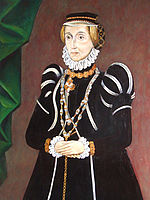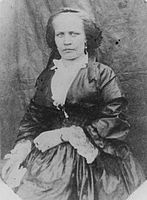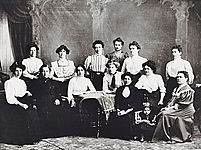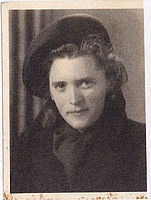
Elisabeth Eipek-Dinzl (1878-1944)
Elisabeth Eipek-Dinzl was the owner and administrator of the Dinzlschloss in Villach. She was an arty woman and socially committed. In her will, she arranged, among other things, the construction of a children's home, a sanctuary for war victims and an animal shelter (Schmidt Alexandra, (2014). "It's my express wish ..." Noble donors. In A. Schmidt (Hg.), Drautöchter (2014) (S. 80-82), Klagenfurt/Celovec: Johannes Heyn Verlag.)

Anna Neumann (1535-1623)
Anna Neumann was a business woman in the town of Villach of the 16th and 17th century. She was married six times. Anna Neumann was repeatedly confronted with rumors and slander by her economic success and unusual way of life (See Schmidt, Alexandra (2014). "Wherever the Neumanin was wealthy ..." Anna Neumann. In A. Schmidt (Hg.), Drautöchter (2014) (S. 36-39), Klagenfurt/Celovec: Johannes Heyn Verlag.)

Mathilde Martens (1834-1911)
Mathilde Martens was born in 1834 at Schloss Kellerberg near Villach. She grew up in an artistically active family. Her own work as a painter gradually established her, especially after 1870. Mathilde Martens was an unconventional woman for her time. From 1876 she earned a living for herself and her children as a restorer in Vienna (see Schmidt, Alexandra (2014). "An energetic woman and proficient portrait painter ..." Mathilde Martens. In A. Schmidt (Hg.), Drautöchter (2014) (S. 75-79), Klagenfurt/Celovec: Johannes Heyn Verlag.)
Rosa Ermacora (1885-1957)
Rosa Ermacora was born in Ljubljana and worked as a teacher in Villach. She was the director of the elementary school in St. Martin. Rosa Ermacora was also artistically active. In 1970 a collective exhibition of her works took place in the Künstlerhaus in Klagenfurt. (see Anton Kreuzer: Kärntner Biographische Skizzen, Klagenfurt 1995)
Maria Gornik (1900-1942)
Maria Gornik was born in Poland and she was Jewish. In 1920 she married Wilhelm Gornik and lived from then on in Villach. Maria Gornik was exposed from 1938 onwards to massive anti-Semitic resentment. She was arrested several times by the Gestapo and deported to the Ravensbrück concentration camp in 1941. From there she came to Auschwitz in 1942, where she was murdered on 16 October (see Rettl, Lisa, Schmidt, Alexandra (2014). "You can hardly imagine my despair ..." Maria Gornik. In A. Schmidt (Hg.), Drautöchter (2014) (S. 194-205), Klagenfurt/Celovec: Johannes Heyn Verlag.)

Dora Kircher (1881-1953)
Dora Kircher was one of the first women in the municipal committee of Villach in 1919. She was from 1918 chairwoman of the Action Committee of the free political women in Villach and was also a member of the Social Democratic Party. In 1921 she was the first Villach woman in the Carinthian state parliament (see Schmidt, Alexandra (2014). "We go forward, despite all this and all that!" Aufbrüche und Einbrüche in der ersten Hälfte des 20. Jahrhunders. In A. Schmidt (Hg.), Drautöchter (2014) (S. 155-168), Klagenfurt/Celovec: Johannes Heyn Verlag.)

Gertrude Gabler (1923-2012)
Gertrude Gabler was one of the first women in Villach to receive training in civil engineering. She first attended the commercial school, but later became enthusiastic about the construction industry. Her education and work situation was difficult because she had to struggle with prejudice as a woman in this male domain (see Schmidt, Alexandra (2014). "Once prove that you can!" Gertrude Gabler. In A. Schmidt (Hg.), Drautöchter (2014) (S. 169-171), Klagenfurt/Celovec: Johannes Heyn Verlag.)
Marie Leopold
With the season 1900/1901, the Viennese Marie Leopold took over the direction of the two theaters in Villach and Klagenfurt. Alone this season, she staged 111 stage plays. The reviews for her work were largely positive. In April 1908, she ended her work as a theater director because she could not agree with the municipalities on the contract (Schmidt, Alexandra (2014). "The favor of the audience is changeable ..." Women in the theater. In A. Schmidt (Hg.), Drautöchter (2014) (S. 149-154), Klagenfurt/Celovec: Johannes Heyn Verlag.)
historic fempath
Place and time in different locations with individual historical biographies
from 10:00 to 11:00 were:
10:00 fempath from the Richard-Wagner-Straße, HTL to the Parkhotel and from 10:20 city tour by car with Gertrude Gabler (see map P1)
10:00 fempath from the coffee Greißlerei, Völkendorferstr. 1 to the city center with Anna Neumann (see map P2)
10:00 fempath from the house of artistic encounter St. Martin to the city center with Rosa Ermacora (see map P3)
10:00 fempath from the Dinzlschloss to the city center with Elisabeth Eipek-Dinzl (see map P 4)
from 11.00 to 12.00:
11:00 fempath from Weißbriachgasse via Hauptplatz to the Köllpassage with Maria Gornik (see map P5)
11:00 fempath at the main square (altitude district pharmacy) with Mathilde Martens 11:00 (see map P6)
11:00 fempath on May 8th place with Marie Leopold (see map P7)
11:00 fempath from Kaiser-Josef-Platz via Karlgasse, Hauptplatz and Rathausgasse with Dora Kircher (see map P8)
from 12:00 to 13:00 with all 8 historical biographies on Hauptplatz, Rathausplatz and 10th Oktoberstraße. (see map P1-8)